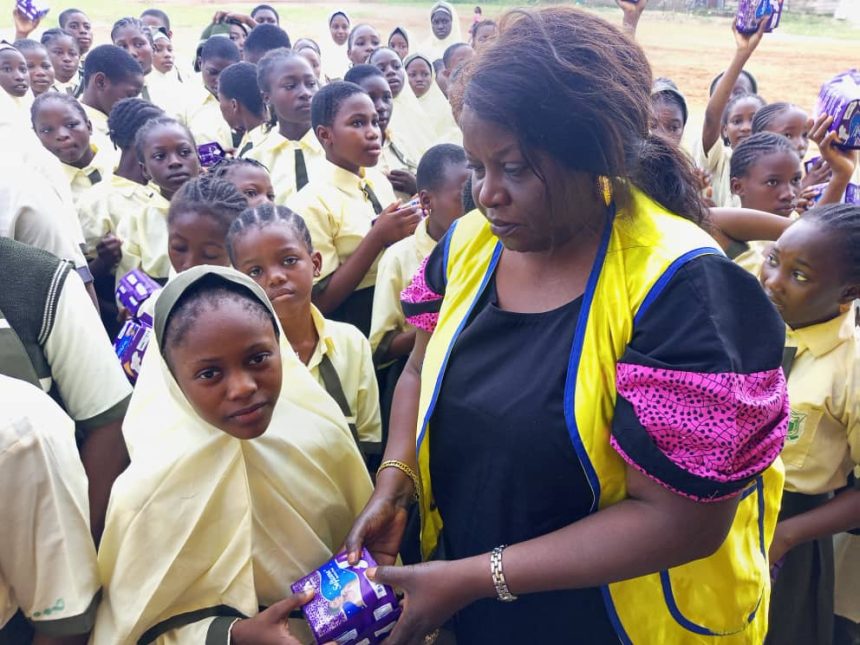Empowering the Future: Abuja Legend Metro Lions Club Supports the Girl Child on International Day of the Girl Child
By: Eric Adile
As the world celebrate the International Day of the Girl Child, the Abuja Legend Metro Club of District 404-A2, Nigeria, of the International Lions Club, is stepping forward to make a profound impact. With the theme “Empowering Girls for a Brighter Future,” this year’s global celebration focuses on strengthening gender equality and fostering opportunities for girls worldwide. In alignment with the UN’s Sustainable Development Goal (SDG) 5, which seeks to “achieve gender equality and empower all women and girls,” the Abuja Legend Metropolitan Club brings tangible support to the girls at Junior Secondary School, Gwarimpa 1, Abuja.
In a significant initiative led by the dynamic Club President, Lion Deborah Matthew, the club distribute sanitary towels to deserving girls at the school. This act is not just a token of care but part of a larger mission that seeks to address critical challenges faced by adolescent girls, particularly in the areas of sexual and reproductive health. The event is emblematic of the International Lions Club’s broader global and national impact, aligning with SDG 5 on “Ensuring universal access to sexual and reproductive health and reproductive rights.”
The International Day of the Girl Child, celebrated annually on October 11 since its adoption by the United Nations in 2011, emphasizes the challenges faced by girls worldwide, from gender-based discrimination to barriers in education and health. The day provides a global platform for advocacy, celebration, and action toward advancing rights and opportunities for girls.
This year’s theme, “Empowering Girls for a Brighter Future,” speaks to the ongoing need to create environments where girls are supported, educated, and empowered to achieve their fullest potential. It also highlights the importance of providing them with the necessary tools, including education on reproductive health and access to hygiene products. This aligns seamlessly with the Lions Club’s initiative, which addresses a critical gap that has long hindered the educational and personal growth of girls in under-resourced communities.
The Lions Club International (LCI), the world’s largest service club organization, was founded in 1917 by Melvin Jones in the United States. What began as a small collective of people wanting to give back to their communities has grown into a global network of 1.4 million members in more than 200 countries.
The Lion Club is known for its contributions to causes that range from fighting blindness and diabetes to promoting environmental sustainability and youth development. Throughout its history, the club has focused on identifying pressing global needs and responding with innovative solutions. In Nigeria, the Lions Club has made a substantial impact, contributing to healthcare, education, and poverty alleviation efforts across the country.
One of the club’s most significant initiatives is its commitment to empowering young girls and women, recognizing that gender equality is essential to sustainable development. By focusing on the needs of the girl child, the Lions Club helps to address systemic issues that have long marginalized half of the population.
The International Lions Club is deeply committed to advancing the United Nations’ 2030 Agenda for Sustainable Development. With its core principle of “We Serve,” the club has aligned its goals with the SDGs, focusing on ending poverty, ensuring access to healthcare, and promoting quality education. In particular, SDG 5—Achieving Gender Equality and Empowering All Women and Girls—is central to the Lions Club’s work on behalf of women and girls worldwide.
In Nigeria, the Lions Club has demonstrated unwavering dedication to these goals by executing a wide range of programs and initiatives aimed at improving the lives of women and girls. These include health awareness campaigns, education support programs, and initiatives that provide girls with the resources they need to thrive. The initiative at Junior Secondary School, Gwarimpa 1, Abuja, to distribute sanitary towels and provide personal hygiene talk to the girls exemplifies this commitment, addressing a key issue that directly impacts girls’ education and well-being.
In Nigeria, and particularly in rural and underprivileged communities, girls face a multitude of challenges that undermine their potential. One such challenge is the lack of access to basic hygiene products, such as sanitary pads, which can significantly affect a girl’s ability to attend school regularly. Studies show that adolescent girls in Nigeria miss an average of four school days each month due to menstruation-related issues, further widening the gender gap in education.
Lack of menstrual hygiene management can lead to other health issues and reinforce stigmas that keep girls from participating fully in community and educational activities. Addressing this issue requires not only providing girls with sanitary products but also educating them about reproductive health and empowering them to manage their own well-being confidently.
Recognizing the far-reaching impact of menstrual health on education and empowerment, the Abuja Legend Metropolitan Club decided to focus this year’s International Day of the Girl Child celebration on distributing sanitary towels to girls at Junior Secondary School, Gwarimpa 1. This initiative, led by Lion Deborah Matthew, aims to equip the girls with essential resources while fostering an environment of care and support.
The club’s distribution of sanitary towels is a critical step in ensuring that these girls can attend school without interruption. But the event is about more than just handing out supplies. It serves as a reminder to the girls that their health and education matter, that they are not alone in their challenges, and that they have a community of people who are invested in their success.
Moreover, providing sanitary towels also opens up conversations about reproductive health, allowing girls to receive accurate information and learn how to manage their health. This knowledge is crucial in preventing early pregnancies, promoting gender equality, and ensuring that girls can stay in school and complete their education.
The Lions Club International’s reach and impact are global, with over 48,000 clubs in more than 200 countries. The organization’s work spans various causes, from addressing hunger and diabetes to promoting environmental sustainability and youth development.
In recent years, the Lions Club has increasingly focused on gender equality and the empowerment of women and girls. By providing leadership opportunities for women within the club and launching targeted programs for girls, the Lions Club is helping to create a more just and equal world.
In Nigeria, the Lions Club has supported countless initiatives that have had a lasting impact on communities. From building schools to providing healthcare services, the Lions Club has been a beacon of hope and service in some of the country’s most underserved areas.
As the Abuja Legend Metropolitan Club of District 404-A2, Nigeria, joins the international community in celebrating the 2024 International Day of the Girl Child, they do so with a powerful message: girls’ matter, their health matters, and their education matters. Through their initiative to provide sanitary towels to girls at Junior Secondary School, Gwarimpa 1, the Lions Club is helping to ensure that girls can stay in school and take control of their futures.
This initiative is a testament to the Lions Club’s enduring commitment to serving the community and advancing the 2030 Agenda for Sustainable Development. By empowering girls today, the Lions Club is helping to build a brighter, more equitable tomorrow.
(Eric Adile Iroajugh is the Executive Vice Chairman, Alikwomobu Center for Sustainability and Participatory Development– Phone No: 08188675284, Email: princeadile1@gmail.com


Leave a Reply